| Srl | Item |
| 1 |
ID:
154328
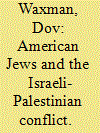

|
|
|
|
|
| Summary/Abstract |
Analyzes the role played by American Jews and American Jewish pro-Israel organizations in the conflict between Israel and the Palestinians. He challenges the popular notion that the pro-Israel lobby powerfully influences U.S. policy pertaining to the Israeli-Palestinian conflict.
|
|
|
|
|
|
|
|
|
|
|
|
|
|
|
|
| 2 |
ID:
077570
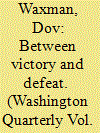

|
|
|
|
|
| Publication |
2007.
|
| Summary/Abstract |
Israel now stands at a crossroads. The lessons it draws from its recent war with Hizballah will shape future Israeli thinking and its relations with the Palestinians as well as the rest of the Middle East. It is imperative that it learns the right ones.
|
|
|
|
|
|
|
|
|
|
|
|
|
|
|
|
| 3 |
ID:
145761


|
|
|
|
|
| Summary/Abstract |
After years of wishful thinking and failed efforts at Israeli–Palestinian peacemaking, the Obama administration has now finally acknowledged what most observers have been saying for some time—there is no chance of a two-state solution to the conflict, at least in the next couple of years.1 Many now question whether such a solution will ever be possible. Although diplomats and experts have long regarded a two-state solution as the best way to resolve this most intractable conflict—and for the last two decades, a majority of Israelis and Palestinians have agreed with this—this conventional wisdom is now seriously in doubt.
|
|
|
|
|
|
|
|
|
|
|
|
|
|
|
|
| 4 |
ID:
111225
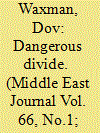

|
|
|
|
|
| Publication |
2012.
|
| Summary/Abstract |
This article examines the relations between Jewish and Palestinian-Arab citizens of Israel since the events of October 2000, when massive Arab protests and riots took place and thirteen Arab demonstrators were killed. In the decade since then Arab-Jewish relations have been characterized by growing mutual mistrust, fear, and hostility. Together with these negative attitudes, political polarization between the two communities has also increased. This poses a serious threat to Arab-Jewish coexistence in Israel and to Israeli democracy itself.
|
|
|
|
|
|
|
|
|
|
|
|
|
|
|
|
| 5 |
ID:
082289
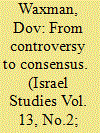

|
|
|
|
|
| Publication |
2008.
|
| Summary/Abstract |
For many years, the debate over whether Israel should withdraw from the West Bank and Gaza dominated Israeli public discourse and aroused intense passions and hostilities. This is no longer the case. This debate is far less divisive and bitter than it once was. In Israel there is broad public support for a withdrawal from much of the occupied territories, and the debate is mostly about the extent, manner, and timing of this withdrawal. This article explains why the policy of territorial withdrawal has become less controversial in Israel in recent years. It examines the debate over the future of the West Bank and Gaza during the years of the Oslo peace process and argues that the debate over territorial withdrawal was then part of a broader cultural conflict. Although this cultural conflict has not been resolved, the issue of territorial withdrawal is no longer at the center of this conflict. The removal of the issue of the territories from this broader cultural conflict has allowed for the emergence of a broad domestic consensus over a policy of territorial withdrawal.
|
|
|
|
|
|
|
|
|
|
|
|
|
|
|
|
| 6 |
ID:
087269


|
|
|
|
|
| Publication |
2009.
|
| Summary/Abstract |
The prevailing opinion that the Bush administration took the United States to war against Iraq in March 2003 under false pretenses has led many to believe that Israel's security was the secret rationale for the war. According to this "war for Israel" thesis, neoconservative policymakers in the Bush administration, the pro-Israel lobby in the United States, and Israel's government all pushed the United States to go to war with Iraq for the sake of Israel's security. This article critically assesses this controversial claim and examines Israel's role in the U.S. decision to invade Iraq. I argued that while neoconservatives were instrumental in promoting the Iraq war, Israel was not their primary concern and that although American Jewish organizations and the Israeli government did largely support the Iraq war, they did not seek it or actively lobby for it.
|
|
|
|
|
|
|
|
|
|
|
|
|
|
|
|
| 7 |
ID:
082072
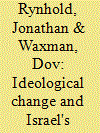

|
|
|
|
|
| Publication |
2008.
|
| Summary/Abstract |
Jonathan Rynhold and Dov Waxman posit that ideological change within the right-wing Likud party generated support for the partition of Israel that was a vital prerequisite to the Sharon government's adoption of the Gaza disengagement plan in 2005. Although international and domestic pressures were important in determining certain elements of the withdrawal, they did not dictate the policy of disengagement.
|
|
|
|
|
|
|
|
|
|
|
|
|
|
|
|
| 8 |
ID:
149085
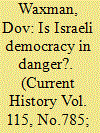

|
|
|
|
|
| Summary/Abstract |
Demographic shifts have contributed to an illiberal trend also fueled by five decades of occupation and settlement of Palestinian lands. The new right-wing majority is trying to stifle dissenting voices.
|
|
|
|
|
|
|
|
|
|
|
|
|
|
|
|
| 9 |
ID:
184490
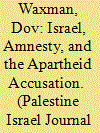

|
|
|
|
|
| Summary/Abstract |
For many people, the term “apartheid” immediately brings to mind the segregation, discrimination, and repression of black South Africans during the decades of white minority rule there. In fact, the word itself means “apartness” in Afrikaans, and it was first used by the ruling party in South Africa in 1948 to describe the racial laws and regulations it imposed, purportedly to preserve the purity and primacy of the country’s white population. As the long struggle of black South Africans for equality and democracy gradually gained support around the world, the anti-apartheid movement emerged, and with its incessant calls to boycott, divest from, and sanction South Africa, it gradually turned the country into an international pariah, eventually helping to end apartheid in South Africa and establish a multiracial democracy there. It is this history that the term “apartheid” evokes, and it is what gives the word its emotional power.
|
|
|
|
|
|
|
|
|
|
|
|
|
|
|
|
| 10 |
ID:
068767
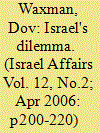

|
|
|
| 11 |
ID:
118389
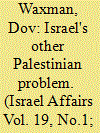

|
|
|
|
|
| Publication |
2013.
|
| Summary/Abstract |
This article examines the challenge Israel faces from its Palestinian minority in light of the publication of the 'Future Vision Documents', a series of seminal documents written by leaders of the Palestinian community in Israel in which they demand that Israel abandon its Jewish identity and recognize its Palestinian citizens as an indigenous national minority with collective rights. The article also assesses the implications of this challenge for the two-state solution to the Palestinian problem.
|
|
|
|
|
|
|
|
|
|
|
|
|
|
|
|
| 12 |
ID:
111106
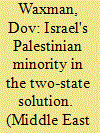

|
|
|
| 13 |
ID:
114081
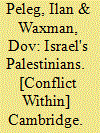

|
|
|
|
|
| Publication |
Cambridge, Cambridge University Press, 2011.
|
| Description |
x, 262p.Pbk
|
| Standard Number |
9780521157025
|
|
|
|
|
|
|
|
|
|
|
|
Copies: C:1/I:0,R:0,Q:0
Circulation
| Accession# | Call# | Current Location | Status | Policy | Location |
| 056711 | 305.899274/PEL 056711 | Main | On Shelf | General | |
|
|
|
|
| 14 |
ID:
189053
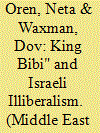

|
|
|
|
|
| Summary/Abstract |
This article assesses democratic backsliding in Israel during Prime Minister Benjamin Netanyahu's years in office from 2009 to 2021, drawing comparisons to similar developments in Hungary and Turkey. While the democratic back-sliding that occurred in Israel during this period resembled what was taking place in these other countries, Netanyahu was less successful in achieving his goals than Viktor Orbán and Recep Tayyip Erdoğan, despite employing similar rhetoric and tactics. Netanyahu's lack of success is explained by the amount and nature of affective polarization in Israel, its parliamentary system of government, and its electoral system.
|
|
|
|
|
|
|
|
|
|
|
|
|
|
|
|
| 15 |
ID:
078821


|
|
|
|
|
| Publication |
2007.
|
| Summary/Abstract |
This article addresses the question of how multiethnic states can manage the relationship between the ethnic majority and the minority. It identifies a series of alternative strategies and methods and applies this classification to two states, Israel and Turkey. The article compares the approaches the two states have taken in dealing with their largest national minorities, and explains how and why these approaches have differed. The article demonstrates how Israel and Turkey adopted two fundamentally different regimes - a civic regime in the case of Turkey and an ethnic regime in the case of Israel - and two different policies towards the largest minority in their midst, assimilation in the case of the former and marginalization in the case of the latter. In both cases, however, the outcome of these policies has been confrontation between the national minority and the state and its ethnic majority. The article concludes by arguing that this similar outcome is due to both states' failure to adopt a genuinely accommodationist approach toward their national minorities
|
|
|
|
|
|
|
|
|
|
|
|
|
|
|
|
| 16 |
ID:
113121
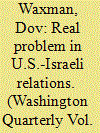

|
|
|
| 17 |
ID:
179180


|
|
|
|
|
| Summary/Abstract |
After four harmonious years of US-Israeli relations, during which the Trump administration was closely aligned with the Israeli government led by Prime Minister Benjamin Netanyahu, the US-Israeli relationship is bound to come under strain during the next four years of Joe Biden’s presidency. Although President Biden himself has always been a strong supporter of Israel since his early days in the US Senate, his administration’s policies and preferences will almost certainly differ substantially from those favored by the Israeli government—whether it is led by Netanyahu or Naftali Bennett (who is farther to the right than Netanyahu).
|
|
|
|
|
|
|
|
|
|
|
|
|
|
|
|